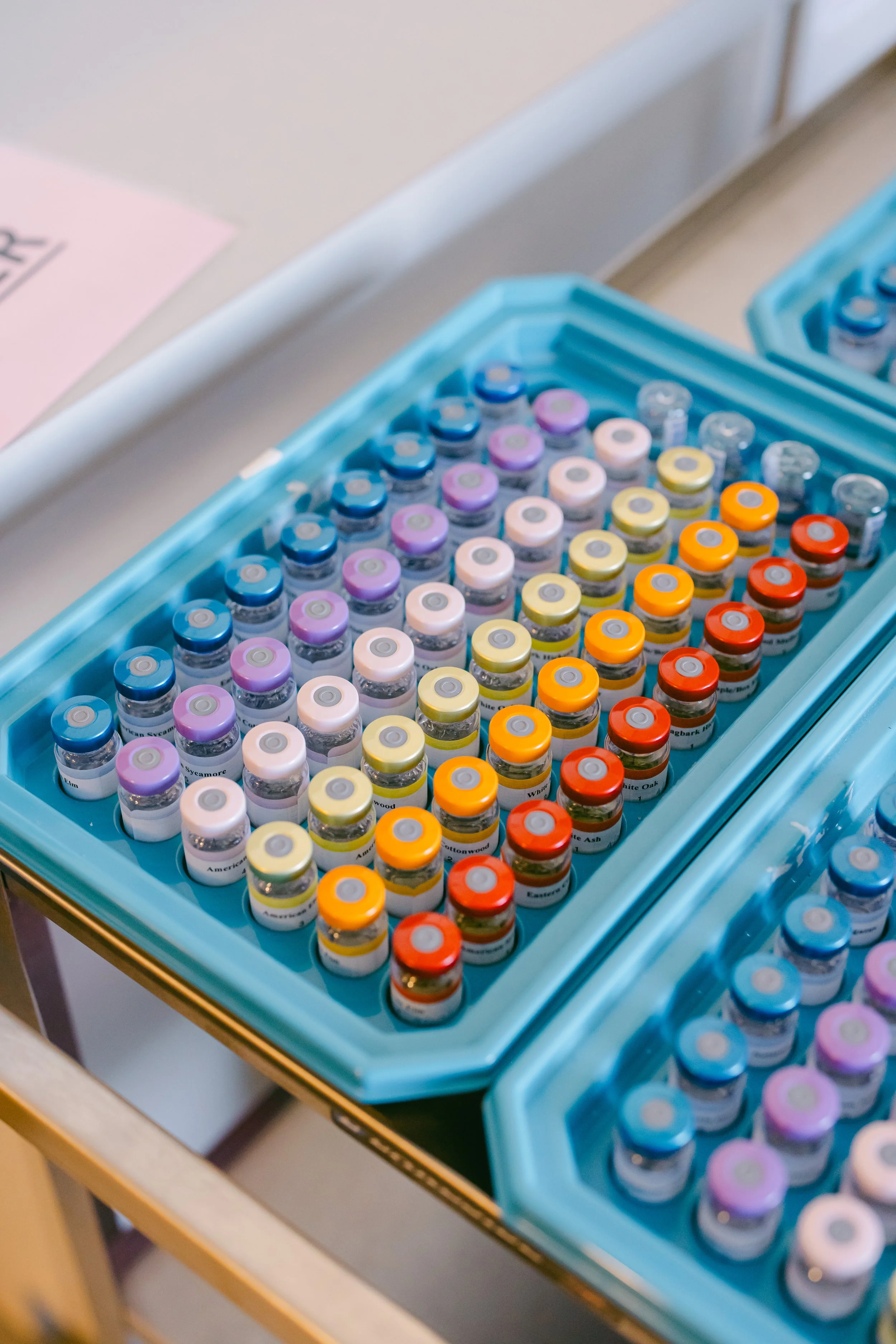Should I Get Allergy Tested?
Allergies can be sneaky. One patient has classic itchy eyes and runny nose. Another patient might have sinus pressure, ear pressure, chronic cough, and fatigue. And both can be reacting to the same pollens or indoor allergens. Testing takes the guesswork out so we can have clarity on what allergens may be causing your symptoms and potentially start retraining your immune system.
Allergy symptoms can be wide-ranging
Seasonal and indoor allergies can manifest beyond the nose:
Nasal symptoms: congestion, itching, frequent sinus infections
Eye symptoms: itching, redness, watering
Chest symptoms: cough, wheeze (especially in allergic asthma)
Ear symptoms: pressure, popping, recurrent infections
Throat/voice: post‑nasal drip, hoarseness, frequent throat clearing
Whole‑body effects: headaches, fatigue, brain fog, sleep disruption, lower school/work performance
If that sounds like your story and you’re not sure what’s triggering it, testing can help connect the dots.
When is allergy testing recommended?
There’s no hard and fast rule, but here are some common scenarios when testing may be beneficial:
When the diagnosis is uncertain. You have symptoms that could be caused by allergies, but the source is unclear (pollen vs. pet vs. dust vs. mold).
To identify specific triggers. You want to know exactly what you react to so you can put smart avoidance strategies in place
When symptoms aren’t controlled. Despite appropriate medications (antihistamines, steroid sprays, rinses, eye drops), you still have bothersome symptoms.
When considering immunotherapy. If you’re thinking about allergy shots or sublingual drops, testing identifies the exact allergens and doses we’ll use for treatment.
When other ENT problems may be allergy‑related. Chronic sinusitis, middle ear fluid/recurrent ear infections, eustachian tube dysfunction, chronic cough, and hoarseness can all have an allergic component.
When symptoms (or complications) affect quality of life. If allergies are disrupting sleep, school/work performance, exercise, or daily life.
What kind of testing is best?
We use combination skin testing (a simple two‑step skin test) and, when appropriate, blood testing.
Combination skin testing (our standard in‑office method)
Two steps per allergen: first a tiny surface "scratch" (skin prick), then a small under-the-skin injection. So one prick and one stick for all 30 allergens we test for.
What it shows: whether your immune system is sensitive to various common airborne triggers like pollens, dust mites, pets, and molds.
Why it helps: accurate and quick results that gives us the exact information we need to design custom immunotherapy if you choose to proceed.
Blood testing (specific IgE)
A standard lab draw that measures allergen‑specific IgE in the blood.
Useful if you can’t pause certain medicines, have widespread skin conditions, or simply prefer a blood test.
How to prepare (so your results are accurate)
There’s a long list of medications that can interfere with skin testing. We will give you tailored instructions in advance. But here’s a short overview of common meds you’ll need to hold before testing:
Antihistamines (cetirizine/Zyrtec, fexofenadine/Allegra, loratadine/Claritin, diphenhydramine/Benadryl)
Some prescription sleep/anxiety meds with antihistamine properties (e.g., hydroxyzine, doxepin)
Certain stomach acid reducers (some H2 blockers)
Some antidepressants (especially tricyclics)
Topical steroids
Βeta blockers
You generally do not need to stop inhaled steroids, nasal steroid sprays, or asthma controller medicines. If you use beta‑blockers or have severe/uncontrolled asthma, these may be a contraindication to skin testing and/or immunotherapy.
What happens on test day?
We use a standard regional panel for everyone (trees, grasses, weeds, dust mites, animal danders, molds). Your history helps us interpret the results.
Skin testing takes about 90 minutes start to finish. Blood testing is a routine lab draw.
You’ll leave with results the same day for skin testing, and we’ll have the information we need to custom‑compound your immunotherapy vials if you choose to proceed. (For blood tests, results typically return in a few days.)
Making sense of results
A positive test means your immune system makes IgE antibodies to that allergen. We interpret results in context: your symptoms, timing, exposures, and the size/level of the reaction. Sensitization doesn’t always equal clinical allergy; in other words, just because you have a positive test result doesn’t mean it necessitates treatment. Your story matters—we treat patients, not test results.
What we do with the results
1) Smarter avoidance & environment control. Actionable steps matched to your triggers—pollen timing, dust‑mite bedding encasements, HEPA filtration, pet strategies, mold moisture control.
2) Optimize medications. We tune your plan (nasal steroid spray, oral antihistamine or antihistamine sprays, antihistamine eye drops, rinses) around triggers and timing.
3) Consider allergy immunotherapy. Allergy shots or drops can retrain the immune system, reducing symptoms, medication use, and the risk of asthma flares for many patients.
If you suspect you have seasonal (trees, grasses, weeds) or perennial (molds, danders, dust mites) allergies, testing is the fastest way to move from trial‑and‑error to a personalized plan, so you can sleep better, breathe easier, and feel like yourself again. Ready to find your triggers and get a customized plan? Give us a call to schedule an appointment!

